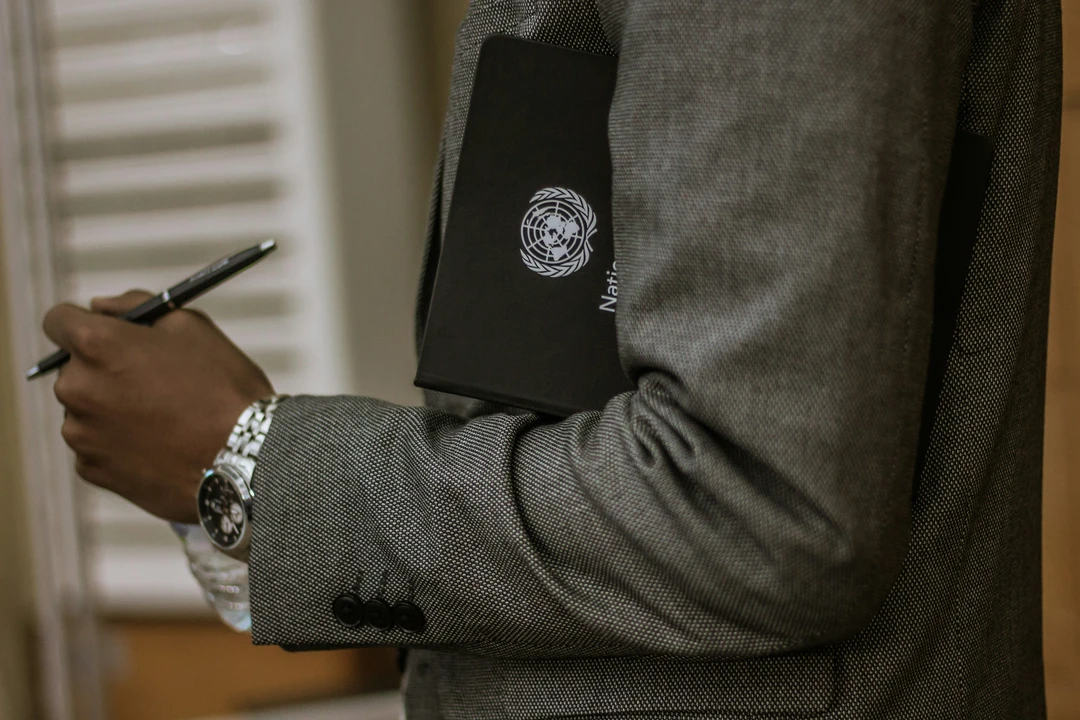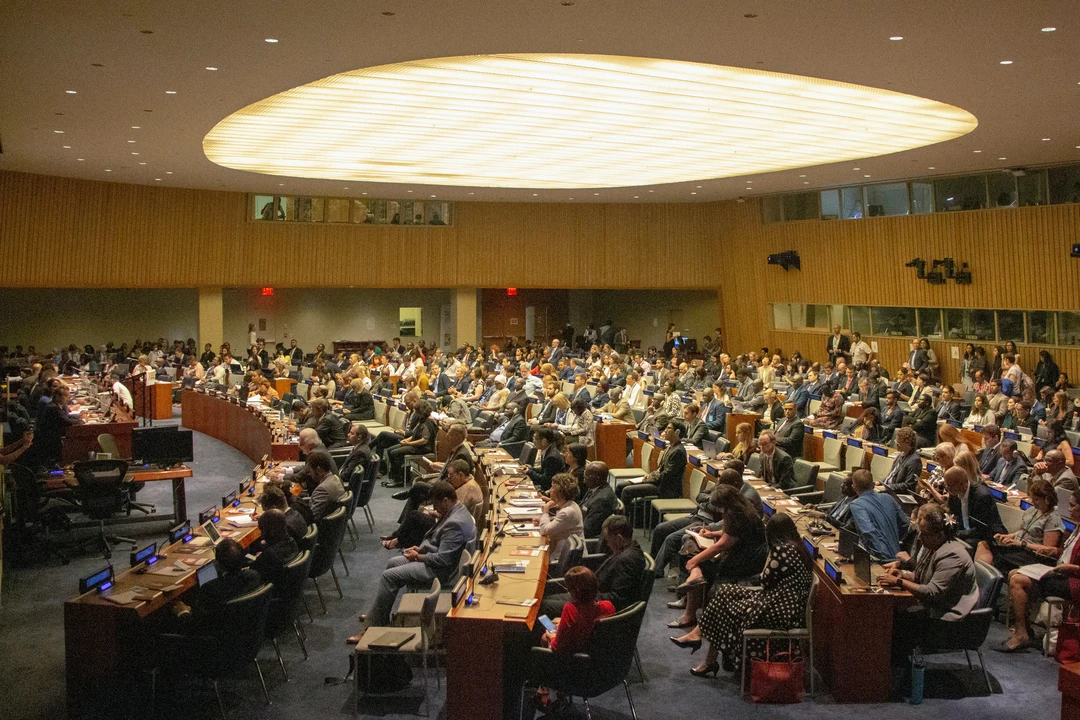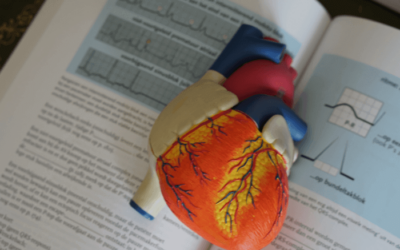What Is the United Nations (UN)?

The UN, or United Nations, is an international, intergovernmental institution set up in 1945. This was after World War II caused the collapse of its predecessor, the League of Nations. Currently, the UN represents 193 of the world’s 196 sovereign states.
Why Was the UN Created?
The foundation of the UN was motivated by an international wish to avoid a third, catastrophic world war. In many ways it’s an improved version of the League of Nations, as the founders were able to actively avoid the failures of the earlier body.
The aims, purposes and principles of the UN can be found in two main documents: the Charter, signed in 1945, and the Universal Declaration of Human Rights, signed in 1948. The Statute of the International Court of Justice is an essential part of the Charter, and outlines the legal role of the UN.
How Is the UN Structured?
The General Assembly
The UN has a General Assembly, led by an elected president, in which every member state participates. The Assembly is the main discussion forum in the UN, and also passes non-binding resolutions expressing the results of its debates. The General Assembly delegates work to its six committees:
- Disarmament & International Security
- Economic & Financial
- Social, Humanitarian & Cultural
- Special Political & Decolonisation
- Administrative & Budgetary
- Legal
Other than the General Assembly, the UN also has several smaller forums: the Security Council, the Economic and Social Council, the International Court of Justice, the UN Secretariat and the Trusteeship Council.
This last forum, which administered ex-colonial trust territories, has been inactive since 1994 when its last trust territory gained independence.
The Security Council
The Security Council is in charge of protecting international peace and security. It’s made up of five permanent members, all of whom have the power to veto decisions. These members are the USA, the UK, France, China and Russia.
The other ten members making up the Council are UN member states selected on a rotating basis. These rotating members are chosen in a way to guarantee fair representation of each global region.
Five of the non-permanent members come from Africa or Asia (currently Cote d’Ivoire, Equatorial Guinea, Indonesia, Kuwait and South Africa) one from Eastern Europe (currently Poland), two from Latin America (currently the Dominican Republic and Peru) and two from Western Europe or other areas (currently Belgium and Germany).
The Secretariat
The Secretariat is the UN’s executive, meaning it implements the decisions the Council makes. The UN is led by the head of the Secretariat, the Secretary-General, currently the Portuguese politician António Guterres.
The Secretary-General is also responsible for bringing international security threats to the attention of the Council. They also represent the UN in negotiations.
The Economic and Social Council
The UN includes several specialised agencies and self-governed subsidiary agencies, coordinated by the Economic and Social Council (ECOSOC). These agencies include the World Bank Group, the World Health Organisation, the World Food Programme, UNESCO and UNICEF.
ECOSOC is made up of representatives from 54 member states, elected every three years by the General Assembly, and has the largest budget of any UN subsidiary body. ECOSOC also acts in a consulting capacity for many non-governmental organisations (NGOs).
The International Court of Justice
The International Court of Justice rules according to international law on disputes brought to it by disagreeing countries. Its decisions are binding for UN member states. The Court also provides legal guidance to other UN institutions.
The International Court of Justice is made up of 15 judges, each from a different state, elected for nine-year terms by the General Assembly and the Security Council.
What Does the UN Do?
The UN’s stated aims are to:
- Maintain peace and security
- Protect human rights
- Promote sustainable development
- Provide humanitarian assistance
- Uphold international law

Peacekeeping
The League of Nations’ lack of physical authority was one of the key reasons for its downfall, and the UN wished to learn from this shortcoming. However, they did not wish to establish a traditional army, so opted instead for a peacekeeping force.
The UN peacekeepers are deployed by the Secretariat and sent to regions experiencing conflict in order to assist with the transition to peace. They do not use force unless in self-defence or in defence of their mandate, and only intervene if all parties involved consent to their presence. There are currently 13 active peacekeeping missions around the world.
In 1988, the UN Peacekeeping Force won a Nobel Peace Prize.
Human Rights
The UN Human Rights Council is responsible for promoting and protecting human rights across the world. They identify human rights violations, and help local governments tackle them. They also respond to humanitarian emergencies.
They publish an extensive review on the human rights provision in each of the UN’s member states every four years.
Sustainable Development
The UN has established 17 Sustainable Development Goals (SDGs), encompassing everything from climate change to tackling poverty and inequality. The target for achieving these goals is 2030, and regular SDG Summits are held with world leaders in order to track progress.
Humanitarian Assistance
The Office for the Coordination of Humanitarian Affairs falls under the UN Secretariat, and coordinates international humanitarian relief in the face of natural and man-made disasters which are beyond the scope of national governments alone.
This has been one of the UN’s most important uses since its foundation, when it assisted the rehabilitation of post-War Europe.
International Law
As mentioned above, the International Court of Justice is a body within the UN responsible for ruling on international disputes. The UN also assists with the formulation of international treaties, and provides legal advice to member states.
The United Nations is the most important intergovernmental organisation currently in existence. Since its foundation it has endeavoured to promote peace, human rights and sustainability in its 193 member states.
If you’d like to find out more, you can visit the UN website, or listen to an interview with the current Secretary-General, António Guterres.
Recommended articles
Best Universities to Study Medicine in the World
A degree in Medicine spans many years, so it’s important to make a good choice when committing yourself to your studies. This guide is designed to help you figure out where you'd like to study and practise medicine. For those interested in getting a head start, the...
What Is A Year Abroad?
One of the great opportunities offered to UK university students is taking a year abroad. But what does this involve? Who can do it? What are some of the pros and cons? In our year abroad guide, we’ll explain some of the things to bear in mind when considering this...
The Ultimate Guide To Summer Internships
Are you eager to make the most of your summer break and jumpstart your career? There are so many productive things students can do in the summer or with their school holidays, and an internship is one of the most valuable! A summer internship could be the perfect...


